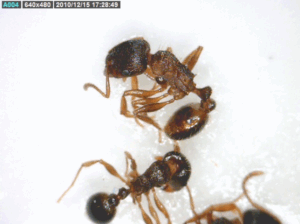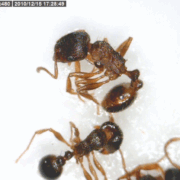Do Ants Bite?
One of the biggest fears people have when it comes to insects is getting bitten. It’s painful, scary, and just not a pleasant experience. But, is this something we need to be worried about when it comes to ants? Unfortunately, it is. Almost all ants are capable of biting (and will if provoked).
The Difference Between an Ant Bite and Ant Sting
First, we should clarify that biting isn’t the only mechanism of defense ants have. Some ants have the ability to sting as well. The main difference between the two lies in the mechanism of delivery. An ant bite involves the ant using their mandibles, also called jaws, to grasp and pierce the skin. On the other hand, a sting requires an ant to have a stinger. This is a sharp part of the ant’s body located on the abdomen. An ant sting is when the ant pierces the skin with its stinger, injecting venom in the process. It should be noted that some ants, such as fire ants, are known to both bite and sting.
Common Types of Biting Ants in Massachusetts
Unfortunately for residents, Massachusetts is home to a number of different types of biting ants. This includes:
- European Fire Ants: These ants are not native to Massachusetts, but are an invasive species which has become more common in some parts of the state. They are small, reddish brown, and tend to build nests under logs, stones, and other objects. They are extremely aggressive when disturbed and will both bite and sting. They have been found in pockets in Cambridge, Arlington, Lexington, and on the North Shore. Their bite is uncomfortable – but not a health threat.

ants with barbs on the thorax
- Asian Needle Ants: These ants are also an invasive species and may have just recently come to Massachusetts. They are small, reddish brown, and have a prominent stinger on the end of their abdomen. The asian needle ant is known to nest in soil, under rocks, and in decaying wood. When disturbed, they will sting. Their sting is painful and can even cause anaphylactic shock in some people. The report of these ants in Bridgewater in June 2025 have not been confirmed.
Being able to identify the most common biting ants can help you to avoid being bitten. It can also serve to inform you of how careful you should be. For example, greater care should be taken around Asian needle ants than pavement ants.
What Do Ant Bites Look Like?
In most cases, ant bites will appear as small, red, raised bumps on the skin. However, depending on the severity of the bite, they may also include one or more of the following characteristics:
- Itching: Some ant bites may cause itching of the skin in the surrounding area.
- Pain: Many ant bites will only be painful when the bite occurs, but some may cause a lingering pain.
- Swelling: The area around the bite may become swollen.
- Blisters: In some cases, ant bites can develop into blisters filled with clear or yellowish fluid.
- Bullseye Pattern: Bites from some species of ants will cause a bullseye pattern to form. This looks like a red center surrounded by a white ring. This is particularly common with fire ant bites.
If any of the above are present, the ant bite may require treatment.
How to Treat Ant Bites
Treating an ant bite is relatively easy and can often be done right at home. First, the bite should be thoroughly washed using soap and water. This step is extremely important in order to prevent infection from taking hold. Then, a cold compress or ice pack should be applied to the area. This will prevent or reduce any swelling and pain. If itching is present, antihistamines should be taken and hydrocortisone cream applied to the affected area. If blisters are present, it is extremely important that you do not pop them. This will increase the risk of infection. If they do pop, it is important to keep the area clean and bandaged.
It should be noted that some ant bites or stings can cause a severe allergic reaction known as anaphylactic shock. Symptoms of this include difficulty breathing, dizziness, nausea, swelling of the face or throat, or a rapid heartbeat. If any of these symptoms are present, professional medical help should be sought immediately.
When Ant Bites Mean a Bigger Problem
Ant bites do not occur regularly. Usually, if they do occur, it means that you have a serious infestation and you can not help but disturb the ants. Ant infestations can get into your food, cause property damage, and lead to more bites. If this sounds like it describes your situation, contact Greenhow’s professional ant control. We are experts at both removal and prevention when it comes to ants. We will help you reclaim your home or business.

